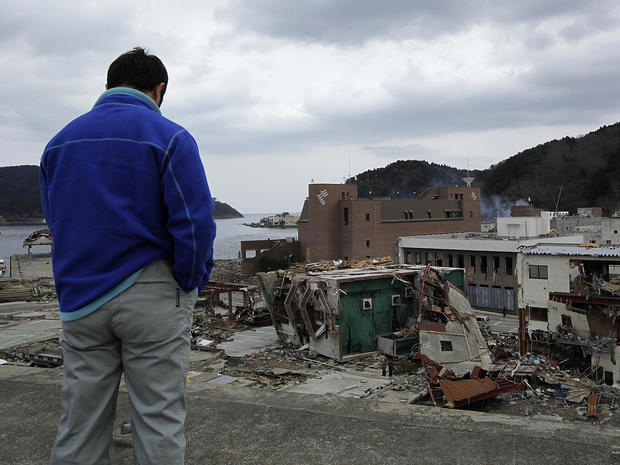Disaster in Japan: Latest developments, March 25
Updated 10:33 p.m. ET
(CBS) CBS News correspondent Lucy Craft reports on Koizumi, where only 42 people are dead or missing thanks to three factors.
(NHK) The Japanese government has released the first aerial video footage of the stricken Fukushima nuclear power site.
The footage was by a Japanese Self-Defense Force helicopter on Wednesday and edited down to a five-minute clip, showing all four of the damaged nuclear reactors. White steam can be seen wafting from the wreckage near a pool for spent nuclear fuel rods, likely the result of seawater injected to cool the spent fuel at Unit 3.
Steam is also seen reacting from a missing panel in the wall of Unit 2. At Units 1 and 4, the footage mostly shows exterior structural damage, as well as what appears to be a collapsed crane within the steel framework of the Unit 4 building.
(CBS/AP) Japanese officials on Friday raised the possibility of a core breach in one of the damaged reactors at the Fukushima nuclear plant -- a development that could lead to more serious radioactive contamination.
The uncertain situation halted work at the nuclear complex, where dozens had been trying feverishly to stop the overheated plant from leaking dangerous radiation. An early indication of the possible breach at Fukushima's Unit 3 came Thursday after cooling water seeped into the boots of three plant workers. Two of the men were hospitalized for exposure to radiation, and the water showed a much higher radiation level that would have been expected.(CBS/AP) Grim milestone: Japan's national police agency said Friday that the confirmed death toll from the earthquake and tsunami which ravaged the nation's northeast on March 11 had passed 10,000. As of late Friday, the police agency reported 10,102 dead, 17,053 missing, and 2,777 injured.
(CBS/AP) Japanese Prime Minister Naoto Kan stressed the gravity of the nuclear crisis in a televised address Friday evening.
"The situation today at the Fukushima Dai-ichi power plant is still very grave and serious. We must remain vigilant," Kan said. "We are not in a position where we can be optimistic. We must treat every development with the utmost care." Kan also apologized to farmers and business owners affected by the crippled power plant and thanked utility workers, firefighters and military personnel for "risking their lives" in efforts to desperately trying to cool the overheated reactors.(CBS/AP) Japan's Chief Cabinet secretary Yukio Edano effectively expanded the evacuation zone around the crippled plant, urging residents living 12 to 20 miles (20 to 30 kilometers) from the plant to leave voluntarily.
People living within the 12-mile radius have already been evacuated, but those in the 12-to-20 mile zone had only been advised to stay indoors to limit exposure to radiation. Edano said people should still be safe from the radiation as long as they stay indoors, but since supplies are not being delivered to the area fast enough, he said it may be better for residents in the area to voluntarily evacuate to places with better facilities. He also held out the possibility of making the evacuations mandatory. The U.S. government has advised Americans to evacuate from anywhere within 50 miles of the plant.(AP) - More than 161,000 foreigners have left Japan since the earthquake and tsunami.
Taichi Iseki, an immigration official at Japan's major airport, Narita, said Friday the number of foreigners flying out from March 11 to March 22 totaled 161,300 -- an eightfold increase from about 20,000 in the same period last year.(CBS) Just 24 hours after it was deemed unfit for infants, the regional governor declared Tokyo's tap water "delicious and safe" for all. Bill Whitaker reports (video).
(CBS/AP) Tokyo shops began rationing basic goods like bottled water, food and toilet paper Thursday as fears of radiation spreading gripped the capital city.
Updates from Thursday, March 24:
